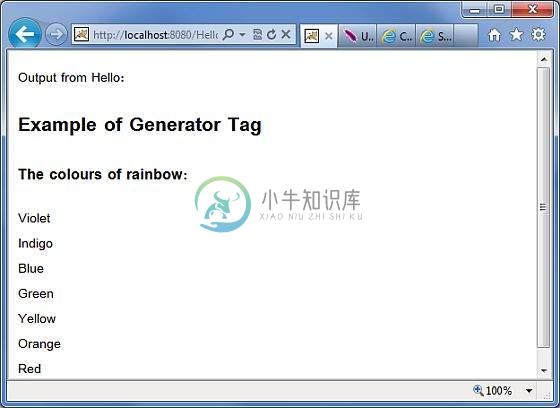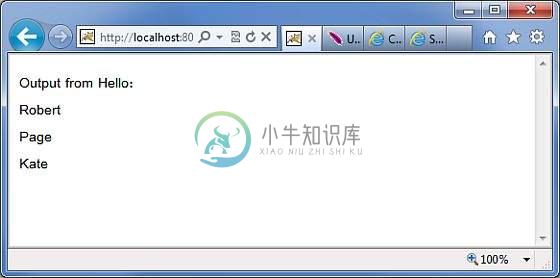检查详细示例(Check Detailed Example)6
优质
小牛编辑
144浏览
2023-12-01
action标签允许程序员从视图页面执行操作。 他们可以通过指定操作名称来实现此目的。 他们可以将“executeResult”参数设置为“true”以直接在视图中呈现结果。 或者,他们可以将此参数设置为“false”,但可以使用action方法公开的请求属性。
创建Action类 (Create Action Class)
package cn.xnip.struts2;
public class HelloWorldAction {
private String name;
public String execute() throws Exception {
return "success";
}
public String getName() {
return name;
}
public void setName(String name) {
this.name = name;
}
}
创建视图 (Create Views)
让我们使用HelloWorld.jsp来演示generator标签的使用 -
<%@ page contentType = "text/html; charset = UTF-8" %>
<%@ taglib prefix = "s" uri = "/struts-tags" %>
<html>
<head>
<title>Hello World</title>
</head>
<body>
<h2>Example of Generator Tag</h2>
<h3>The colours of rainbow:</h3>
<s:generator val = "%{'Violet,Indigo,Blue,
Green,Yellow,Orange,Red '}" count = "7" separator = ",">
<s:iterator>
<s:property /><br/>
</s:iterator>
</s:generator>
</body>
</html>
接下来让我们为employees.jsp提供以下内容 -
<%@ page contentType = "text/html; charset = UTF-8"%>
<%@ taglib prefix = "s" uri = "/struts-tags"%>
<html>
<head>
<title>Employees</title>
</head>
<body>
<s:action name = "hello" executeresult = "true">
Output from Hello: <br />
</s:action>
</body>
</html>
配置文件 (Configuration Files)
你的struts.xml看起来应该像 -
<?xml version = "1.0" Encoding = "UTF-8"?>
<!DOCTYPE struts PUBLIC
"-//Apache Software Foundation//DTD Struts Configuration 2.0//EN"
"http://struts.apache.org/dtds/struts-2.0.dtd">
<struts>
<constant name = "struts.devMode" value = "true" />
<package name = "helloworld" extends = "struts-default">
<action name = "hello"
class = "cn.xnip.struts2.HelloWorldAction"
method = "execute">
<result name = "success">/HelloWorld.jsp</result>
</action>
<action name = "employee"
class = "cn.xnip.struts2.Employee"
method = "execute">
<result name = "success">/employee.jsp</result>
</action>
</package>
</struts>
您的web.xml应该如下所示 -
<?xml version = "1.0" Encoding = "UTF-8"?>
<web-app xmlns:xsi = "http://www.w3.org/2001/XMLSchema-instance"
xmlns = "http://java.sun.com/xml/ns/javaee"
xmlns:web = "http://java.sun.com/xml/ns/javaee/web-app_2_5.xsd"
xsi:schemaLocation = "http://java.sun.com/xml/ns/javaee
http://java.sun.com/xml/ns/javaee/web-app_3_0.xsd"
id = "WebApp_ID" version = "3.0">
<display-name>Struts 2</display-name>
<welcome-file-list>
<welcome-file>index.jsp</welcome-file>
</welcome-file-list>
<filter>
<filter-name>struts2</filter-name>
<filter-class>
org.apache.struts2.dispatcher.FilterDispatcher
</filter-class>
</filter>
<filter-mapping>
<filter-name>struts2</filter-name>
<url-pattern>/*</url-pattern>
</filter-mapping>
</web-app>
右键单击项目名称,然后单击“ Export 》 WAR File以创建War文件。 然后在Tomcat的webapps目录中部署此WAR。 最后,启动Tomcat服务器并尝试访问URL http://localhost:8080/HelloWorldStruts2/employee.action 。 这将产生以下屏幕 -

正如您在此示例中所看到的,我们已将executeResult的值指定为“true”。 因此,hello.action的结果直接在页面中呈现。 HelloWorld.jsp打印彩虹的颜色 - 现在在employee.jsp中呈现
现在,让我们稍微修改一下HelloWorldAction.java -
package cn.xnip.struts2;
import java.util.ArrayList;
import java.util.List;
import org.apache.struts2.ServletActionContext;
public class HelloWorldAction {
private String name;
public String execute() {
List names = new ArrayList();
names.add("Robert");
names.add("Page");
names.add("Kate");
ServletActionContext.getRequest().setAttribute("names", names);
return "success";
}
public String getName() {
return name;
}
public void setName(String name) {
this.name = name;
}
}
最后,修改employee.jsp如下 -
<%@ page contentType = "text/html; charset = UTF-8"%>
<%@ taglib prefix = "s" uri = "/struts-tags"%>
<html>
<head>
<title>Employees</title>
</head>
<body>
<s:action name = "hello" executeresult = "false">
Output from Hello: <br />
</s:action>
<s:iterator value = "#attr.names">
<s:property /><br />
</s:iterator>
</body>
</html>
再次,右键单击项目名称,然后单击“ Export 》 WAR File以创建War文件。 然后在Tomcat的webapps目录中部署此WAR。 最后,启动Tomcat服务器并尝试访问URL http://localhost:8080/HelloWorldStruts2/employee.action 。 这将产生以下屏幕 -


